Back to blog
AI in Ecommerce SEO: Top Tools and Expert Tips to Boost Your Store's Visibility
10
min read
The global ecommerce market is projected to reach a staggering $4.8 trillion by 2025, and by 2027, nearly 23% of total retail sales will take place online. However, despite this rapid growth, competition is fiercer than ever, with the average ecommerce conversion rate hovering around just 3.52%.
In this booming yet crowded space, standing out is no small feat. Search Engine Optimization (SEO) plays a crucial role in making your online store discoverable to potential customers. With countless ecommerce sites competing for visibility, leveraging every available advantage is essential, and that’s where AI comes in. AI is becoming an increasingly valuable tool for simplifying and improving ecommerce SEO efforts.
What is AI in SEO?
AI SEO, or artificial intelligence search engine optimization, leverages AI to improve your web page rankings on search engine results pages (SERPs).
Imagine this: You’re running an online store selling handcrafted leather goods. Somewhere, a potential customer is typing “best leather bags for work” into a search engine. But they don’t stop there. They refine their query with keywords like “affordable,” “handmade,” or even “vegan options.” The search engine scours billions of pages to deliver the most relevant results in milliseconds. The question is: will your store be among them?
With AI working behind the scenes, it identifies the exact keywords your audience uses, optimizing your product descriptions and blog content to match their queries. It predicts emerging trends, so you can launch seasonal promotions before your competitors. As customers browse, AI analyzes their behavior, recommending products or personalizing landing pages to keep them engaged. When search engines crawl your site, AI ensures your technical SEO—like page speed, mobile responsiveness, and structured data—is flawless, giving you a competitive edge.
AI doesn’t just help you keep up; it ensures you stay ahead. By automating manual tasks like keyword research, performance tracking, and content optimization, AI gives you more time to focus on creativity and strategy. It turns SEO into a continuous, data-driven process, where your site adapts in real time to changes in customer behavior and search engine algorithms.
The tech behind AI in SEO tools
AI SEO, or artificial intelligence search engine optimization, relies on advanced tools like machine learning (ML), natural language processing (NLP), and large language models (LLMs) to analyze vast amounts of data. These technologies work together to identify patterns, predict user behavior, and refine content strategies, making your website not only more visible but also more engaging for visitors.
If this sounds a bit too technical, don’t worry, you’re not alone. Thankfully, a wide range of AI-powered tools can simplify these complexities. They take care of the heavy lifting, from pinpointing high-value keywords and optimizing your content to resolving technical SEO challenges and tracking performance. Whether you’re a solo entrepreneur or managing a large ecommerce business, these tools put the power of AI at your fingertips, helping your site rank higher, remain relevant, and deliver a seamless experience for your audience.
Is it time to implement AI in your ecommerce SEO strategy?
If you're wondering whether AI is the next step for your ecommerce SEO strategy, here’s a quick checklist to help you decide:
✅ Do you want to scale without losing quality?
Managing SEO can feel like a full-time job, especially as your business grows. AI helps you scale effortlessly by taking over repetitive tasks like keyword research, content optimization, and performance tracking, all while keeping your quality high.
✅ Are you struggling to keep up with algorithm changes?
Search engine algorithms are always evolving, and customer behaviors shift constantly. AI-powered tools adapt in real-time, keeping your SEO strategy sharp and competitive without requiring constant manual updates.
✅ Do you want to improve your customers’ experience?
AI doesn’t just optimize for search engines, it optimizes for people. By analyzing user behavior, it helps deliver personalized content, faster load times, and smoother navigation, leading to visitors staying longer and converting more often.
✅ Are you ready to make data-driven decisions?
Say goodbye to guesswork. AI turns mountains of data into actionable insights, helping you focus on what truly matters for your SEO strategy. With AI, you can confidently prioritize the actions that drive real results.
If you’ve checked any (or all) of these boxes, AI could be the solution your ecommerce business needs to stay ahead of the competition and deliver an exceptional customer experience. Ready to explore how to make it work? Read on, and you’ll see how AI can help each step in your SEO efforts as well as nifty suggestions for tools that can help you get started.
How AI helps keyword research
If you’ve ever done keyword research manually, you’re probably familiar with how time-consuming and tedious the process can be. Imagine spending hours sifting through endless keyword lists, meticulously checking search volumes, analyzing competition levels, and then cross-referencing this data with user intent, all to identify a handful of valuable terms. The work didn’t stop there; updating these keywords as trends shifted required repeating the process over and over again. It was a slow, resource-heavy effort that often left little time for crafting meaningful strategies or content. For ecommerce store owners juggling countless priorities, this slow, resource-intensive process often meant less time to focus on strategy or creating impactful content.
Keyword research doesn’t have to be a manual, time-consuming process anymore. With AI tools, it becomes a streamlined, data-driven exercise that uncovers high-value opportunities, deciphers user intent, and gives you an edge over competitors. Let’s explore how AI transforms keyword research at every stage of the process:
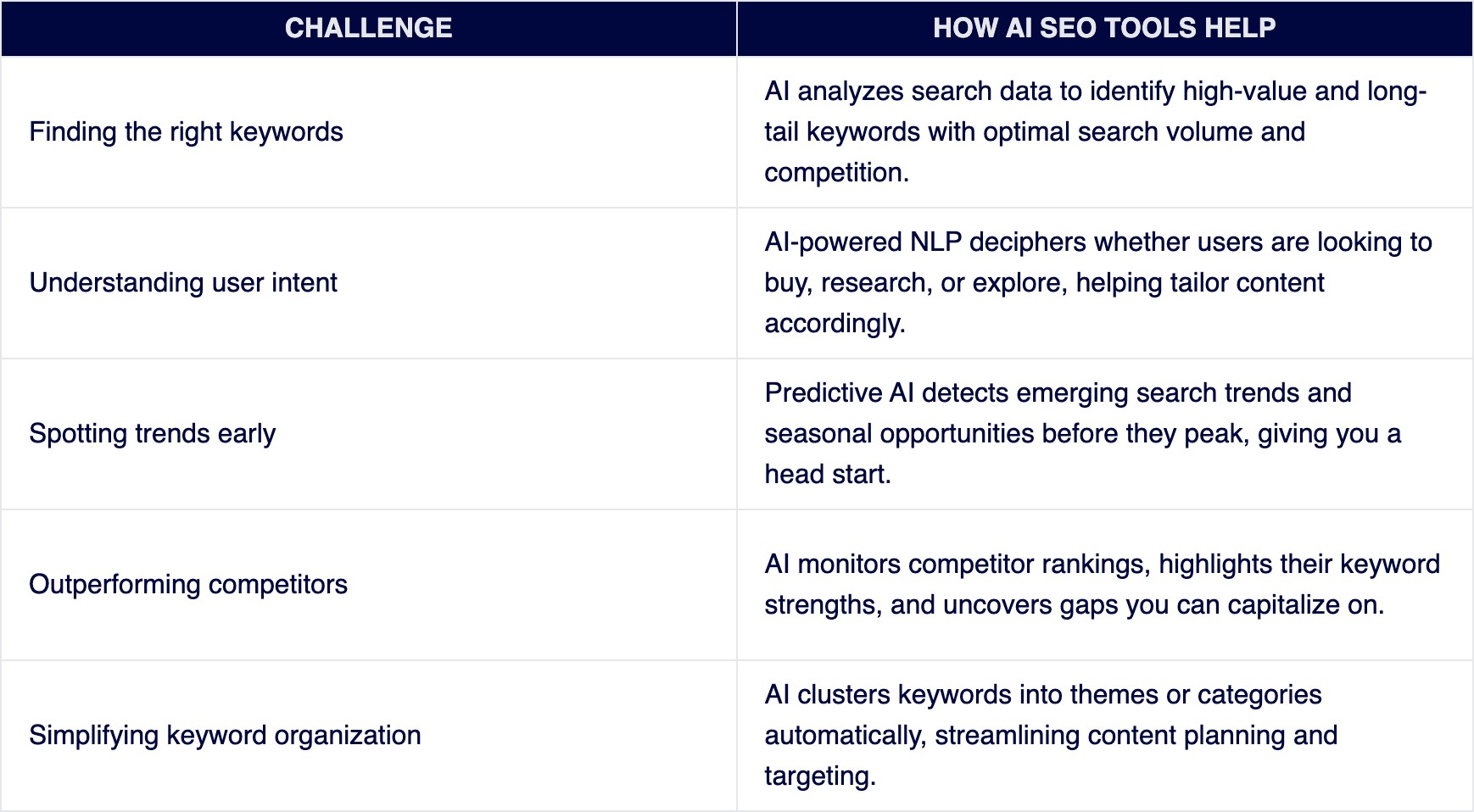
Popular AI-powered keyword tools
Semrush
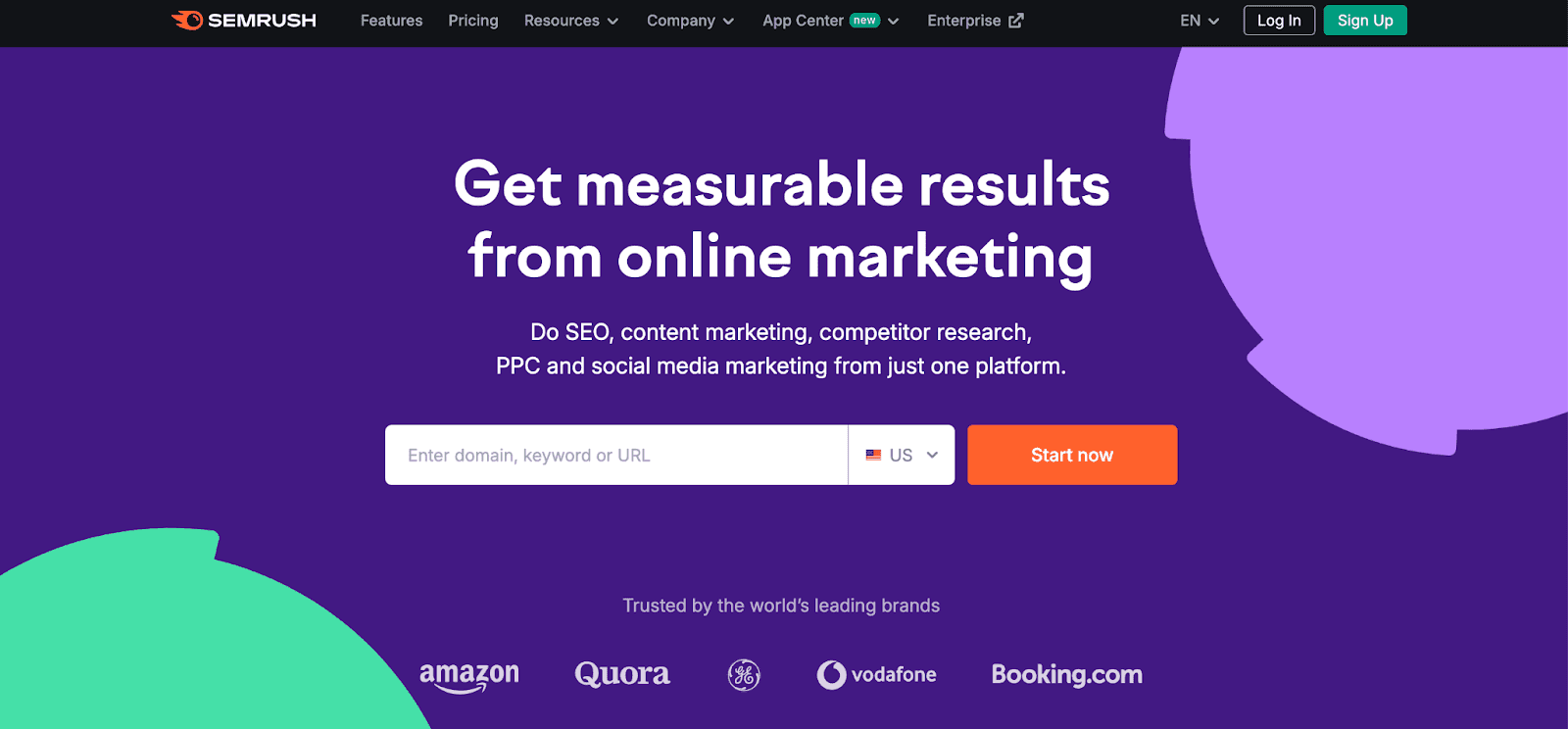
Best for: Growing and established ecommerce businesses with complex SEO needs.
If you’re managing a growing site with diverse keyword requirements or multiple competitors, Semrush is your go-to. It excels at identifying high-value keywords and predicting trends, making it ideal for scaling SEO campaigns. Plus, its comprehensive suite of tools supports everything from rank tracking to site audits.
Ahrefs
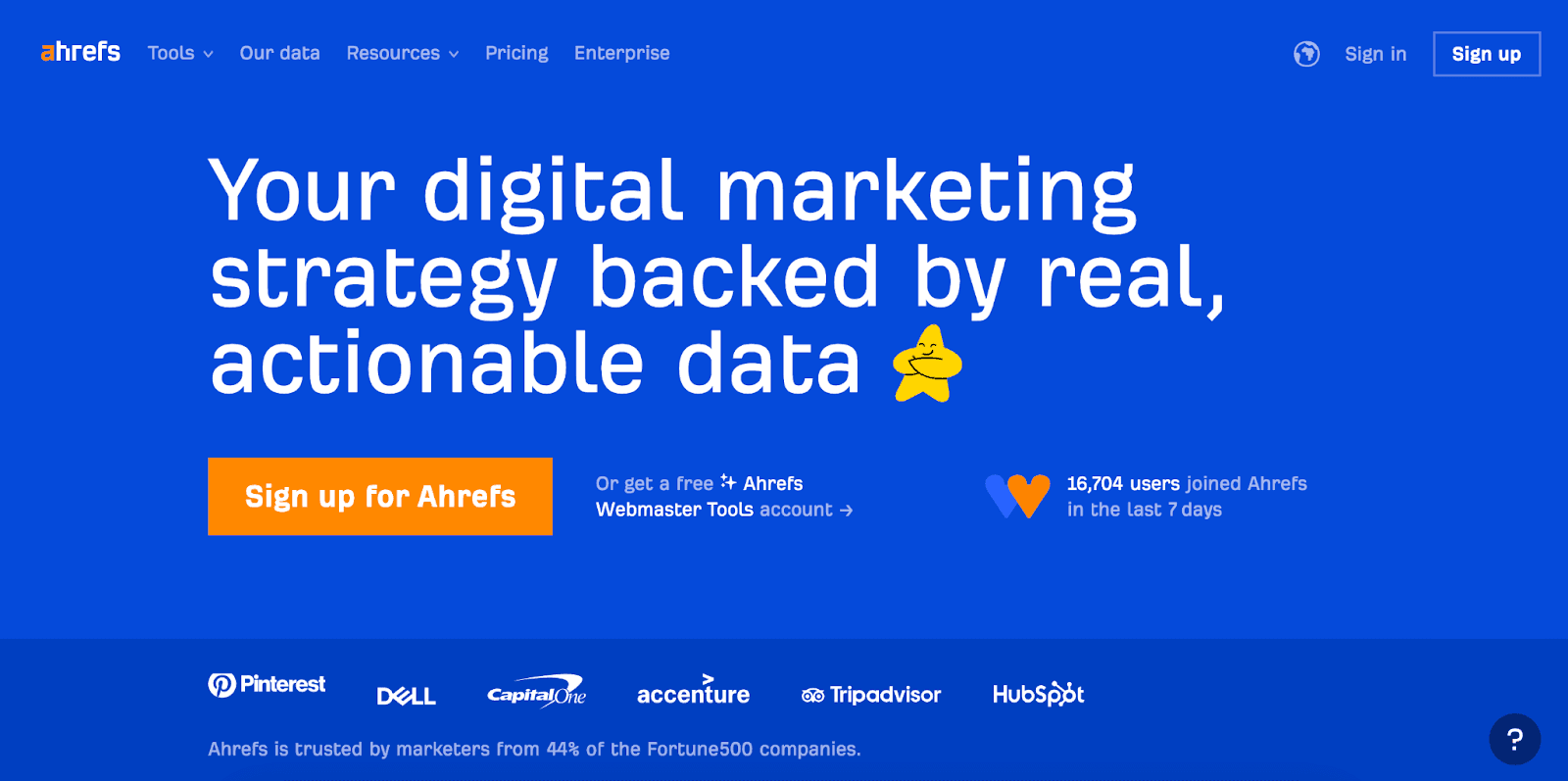
Best for: Smaller and growing ecommerce businesses looking to strengthen their backlink profile and target niche audiences.
Ahrefs is perfect for those focusing on both keywords and backlinks. Its tools uncover search intent and keyword opportunities while helping smaller teams analyze competitors and find link-building opportunities. If your priority is content strategy with a strong backlink foundation, Ahrefs is a great fit.
Twinword Ideas
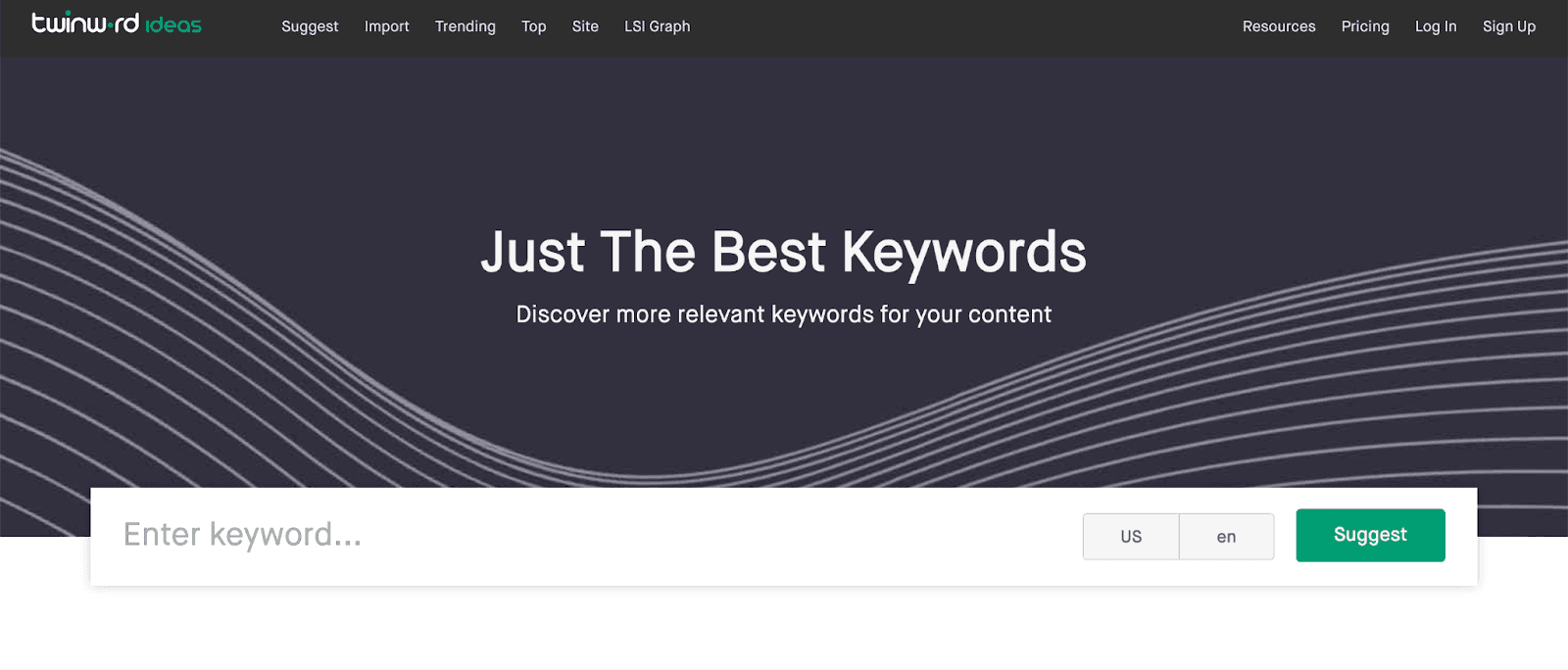
Best for: Ecommerce businesses seeking intuitive keyword research with AI-powered insights.
Twinword Ideas leverages AI to simplify keyword research by analyzing user intent, clustering related keywords, and providing relevance scores. For ecommerce, this means you can quickly identify high-performing keywords tailored to your products or niche. For example, a business selling eco-friendly products could use Twinword Ideas to uncover long-tail keywords like “sustainable home decor” or “organic cleaning supplies,” ensuring their content aligns with customer search behavior.
Why use AI for keyword research?
AI makes keyword research faster, smarter, and more effective. By automating time-consuming tasks, AI tools identify high-value keywords, analyze search intent, and uncover trends you might otherwise miss. They streamline the entire process, ensuring you focus on strategy and content creation instead of manual data crunching. With AI, you can quickly adapt to changing trends, outperform competitors, and target the right audience with precision.
How AI helps content creation and optimization
Creating and optimizing content for SEO is a time-intensive process that requires balancing creativity with technical precision. High-quality content is crucial for search engine rankings, as it directly influences visibility and user engagement. However, keeping up with the demand for fresh, relevant content presents significant challenges. In fact, the top challenges for content creators in 2024 include “differentiating content,” “creating the right content,” and “producing ‘quality’ content”.
AI-powered tools simplify this process by analyzing data, generating ideas, and refining material to align with search engine requirements and audience expectations. By automating these tasks, AI enables marketers to produce high-quality material more efficiently, ensuring that their websites remain competitive in the ever-evolving digital landscape. This transformation allows for a more streamlined and effective approach to content creation and optimization.
That said, AI tools are not a substitute for the human touch—they serve as accelerators, not replacements. Businesses that succeed in SEO leverage AI to handle data-heavy tasks while relying on human expertise to craft compelling, brand-aligned narratives.
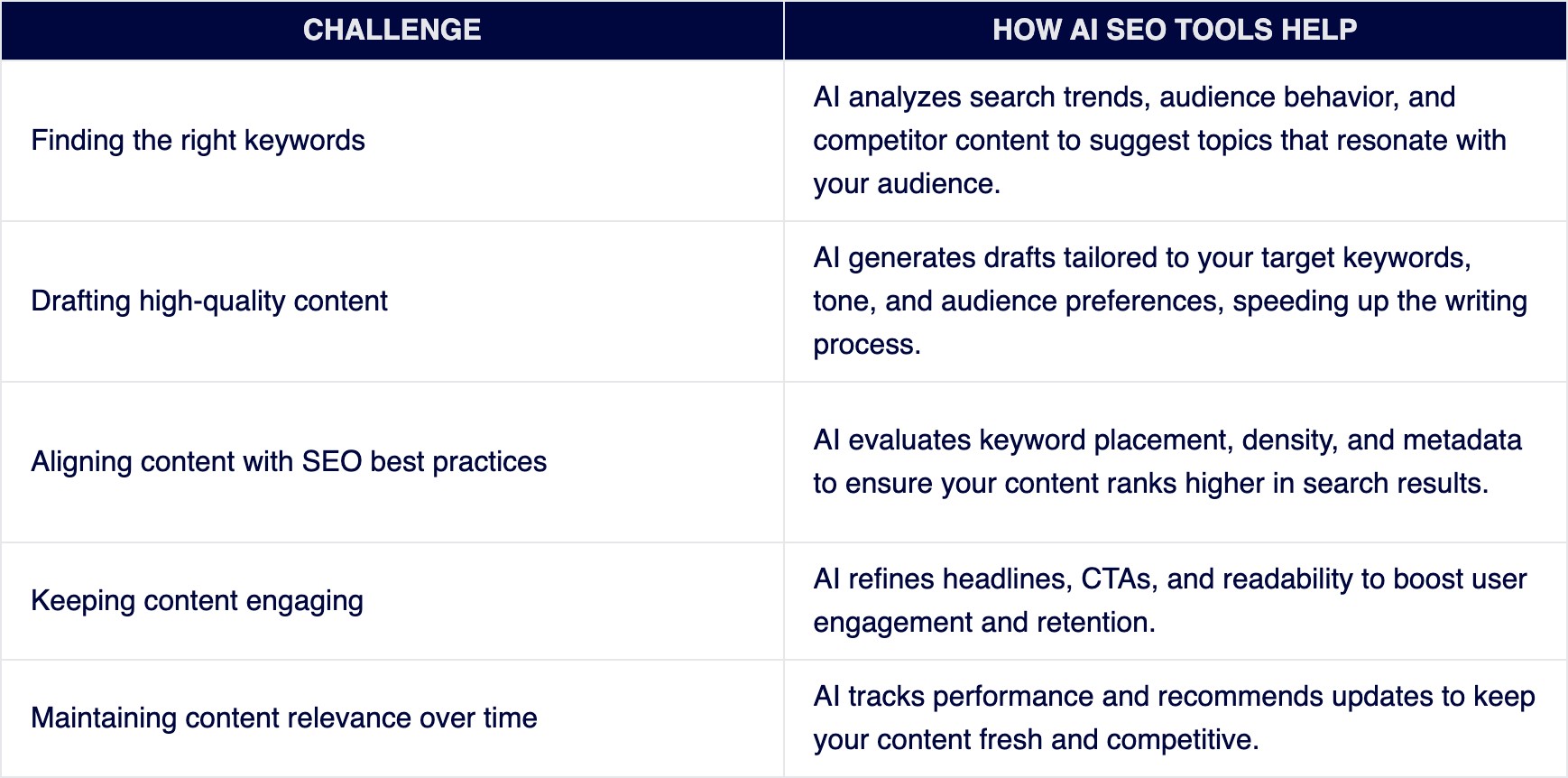
Popular AI tools for content creation and optimization
Jasper AI
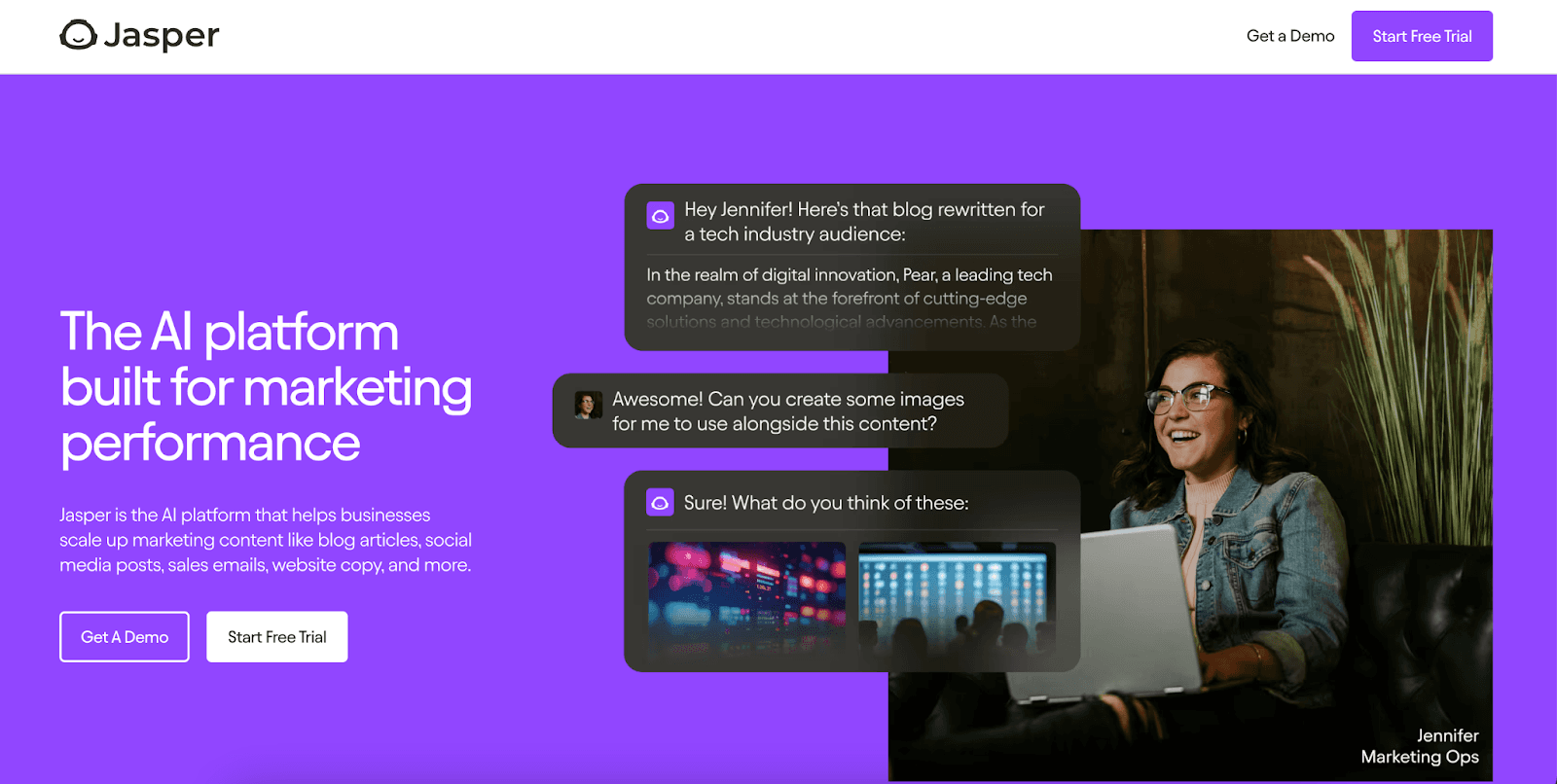
Best for: Ecommerce store owners and marketers looking to generate high-quality product descriptions, blog content, and marketing copy efficiently.
Jasper AI employs advanced AI algorithms to assist with generating various types of content, such as product descriptions, SEO-focused blog posts, and ad copy. For ecommerce store owners, it can simplify the process of creating detailed and consistent product listings, ensuring descriptions align with both customer expectations and SEO requirements. Its features include grammar correction, tone adjustment, and multilingual support, which are particularly useful for businesses targeting diverse markets.
MarketMuse
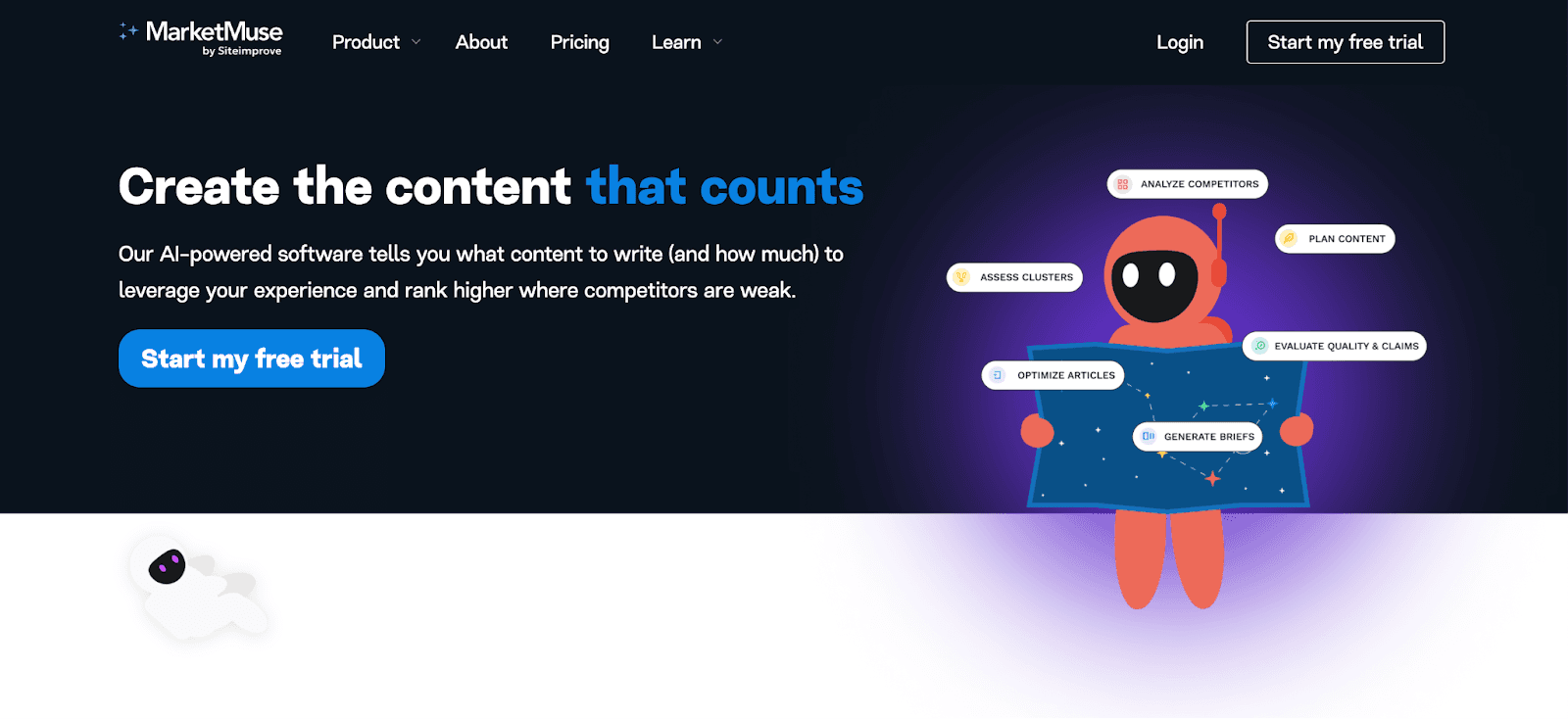
Best for: Ecommerce businesses aiming to improve their content strategy by identifying gaps and optimizing for SEO.
MarketMuse uses AI to perform in-depth content audits, helping ecommerce businesses pinpoint areas where their content may be lacking. For instance, an online beauty store might discover through MarketMuse that it lacks articles on trending topics like “sustainable skincare routines.” By identifying these gaps, the platform recommends keywords and topics that can enhance content relevance and authority in search engine rankings.
MarketMuse also provides insights into topic coverage and competitiveness, allowing ecommerce store owners to prioritize high-value content opportunities. This helps businesses create well-rounded content strategies that address user needs while improving SEO performance.
NeuralText
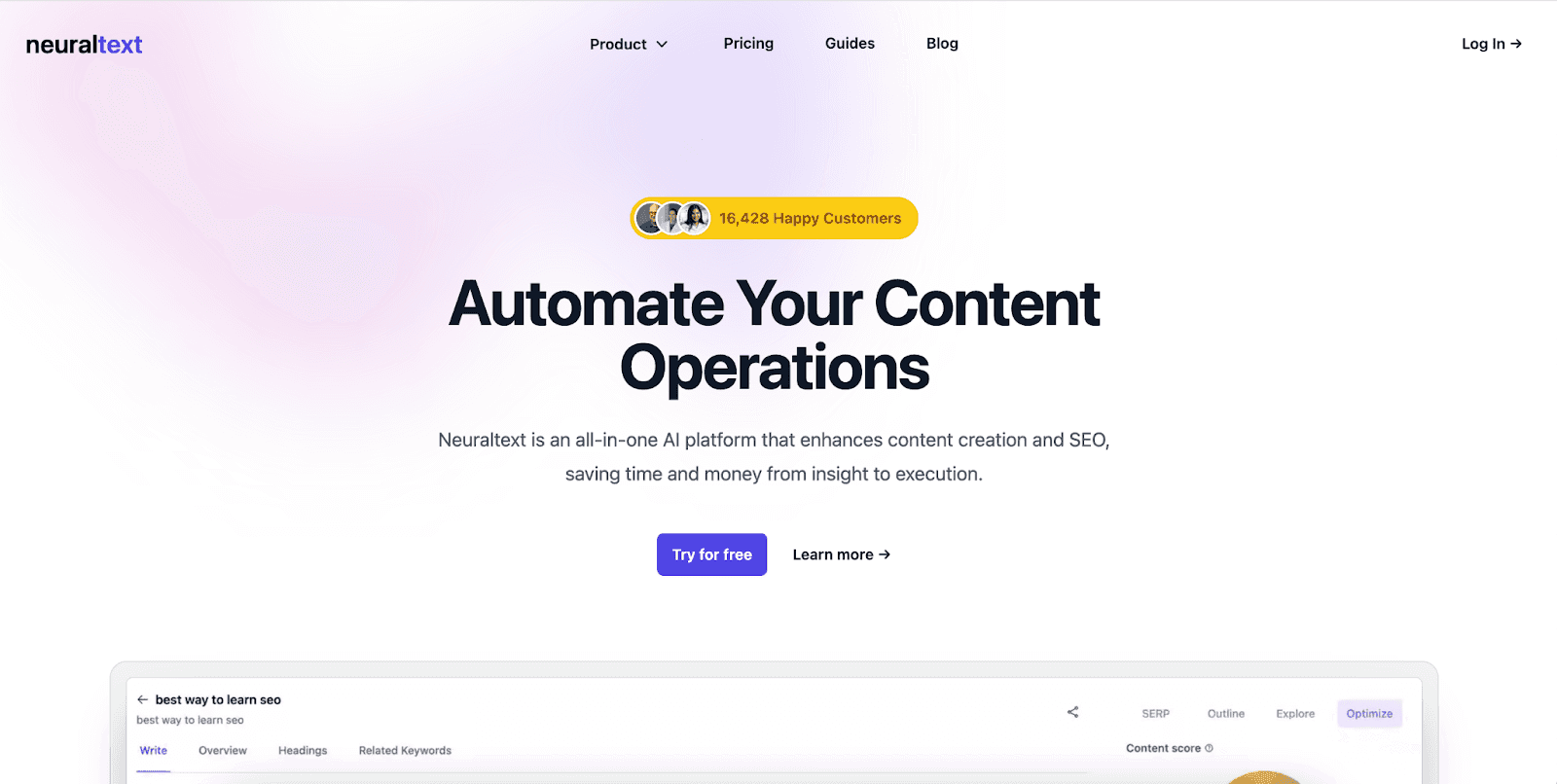
Best for: Small to medium-sized ecommerce stores looking to scale content creation and improve SEO without a large in-house team.
NeuralText is an AI-powered platform that simplifies content creation and optimization for ecommerce businesses. Its tools for keyword discovery, clustering, and SERP analysis help smaller stores compete effectively by identifying relevant keywords and understanding search intent. For example, a boutique skincare brand could use NeuralText to find trending keywords like "natural anti-aging solutions" or "vegan face masks," ensuring their content aligns with current market demands.
The platform’s AI writing assistant aids in creating product descriptions, blog posts, and marketing copy, tailored for businesses with limited resources. NeuralText also provides content briefs and optimization suggestions, making it easier to implement effective strategies that boost search rankings and organic traffic. NeuralText empowers smaller ecommerce stores to produce high-quality, SEO-friendly content efficiently, leveling the playing field against larger competitors.
Why use AI for SEO content creation and optimization?
AI streamlines content creation by automating data analysis, generating ideas, and optimizing material to meet SEO standards. It helps identify trending topics, draft high-quality content, and refine readability for better engagement. By simplifying these tasks, AI enables businesses to produce SEO-friendly, audience-targeted content faster and more efficiently. This ensures your website ranks higher, connects with users, and stays competitive in the ever-evolving digital landscape.
How AI enhances technical SEO
Technical SEO is the backbone that enables search engines to effectively crawl, index, and rank your website. However, manually diagnosing and resolving technical issues can be both complex and time-consuming. Common challenges include ensuring proper site indexing, optimizing page load speeds, and maintaining mobile-friendliness. Addressing these issues often requires meticulous attention to detail and a deep understanding of SEO best practices.
This is where AI tools become invaluable. By automating tasks such as site audits, performance monitoring, and issue detection, AI provides actionable insights that help maintain your site's technical SEO health. For instance, AI-powered platforms can analyze crawl data to identify and prioritize technical SEO tasks, ensuring your website remains optimized for both search engines and users. Integrating AI into your technical SEO strategy not only streamlines the process but also enhances the effectiveness of your optimization efforts, allowing you to focus more on strategic initiatives that drive growth.
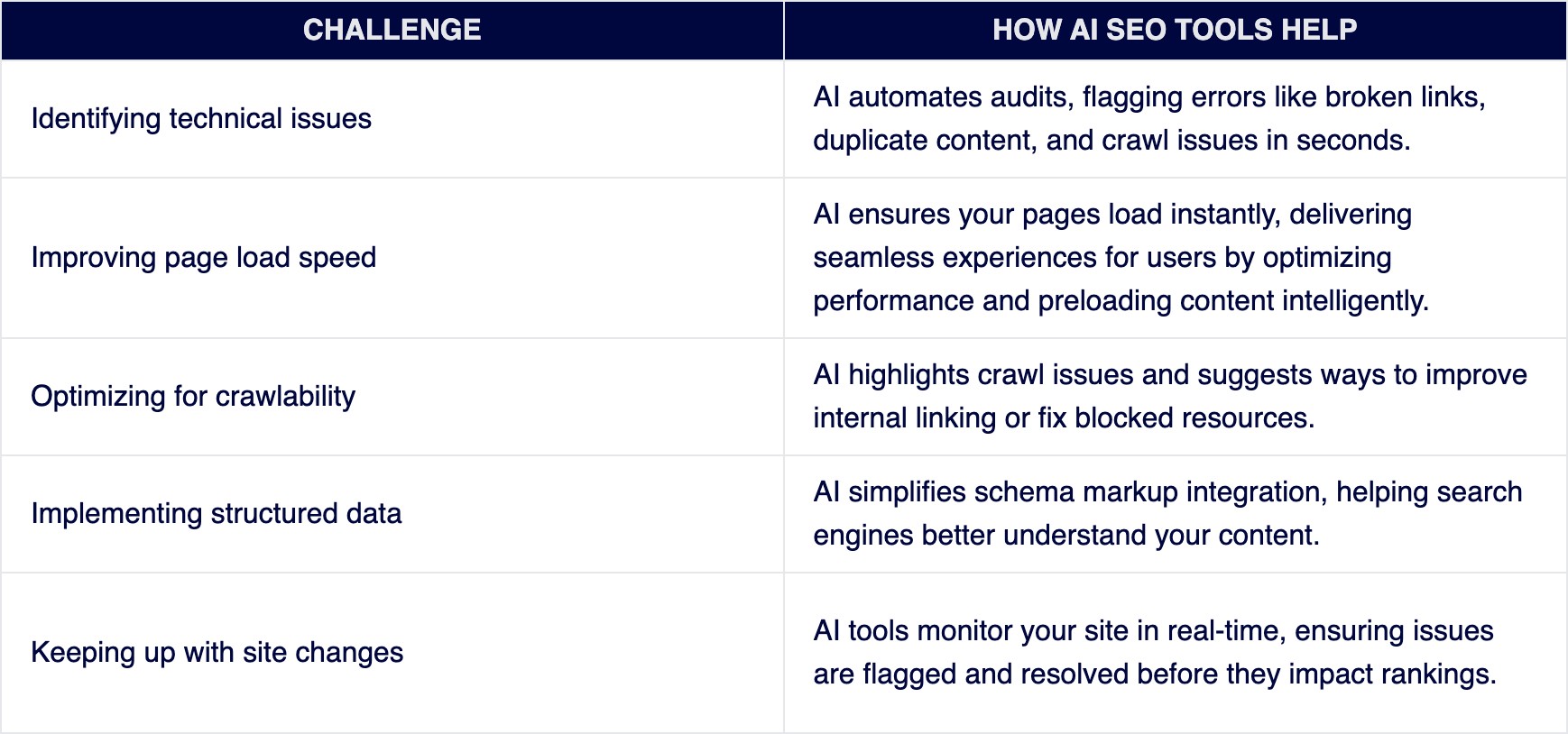
Popular AI tools for technical SEO
Uxify’s Navigation AI
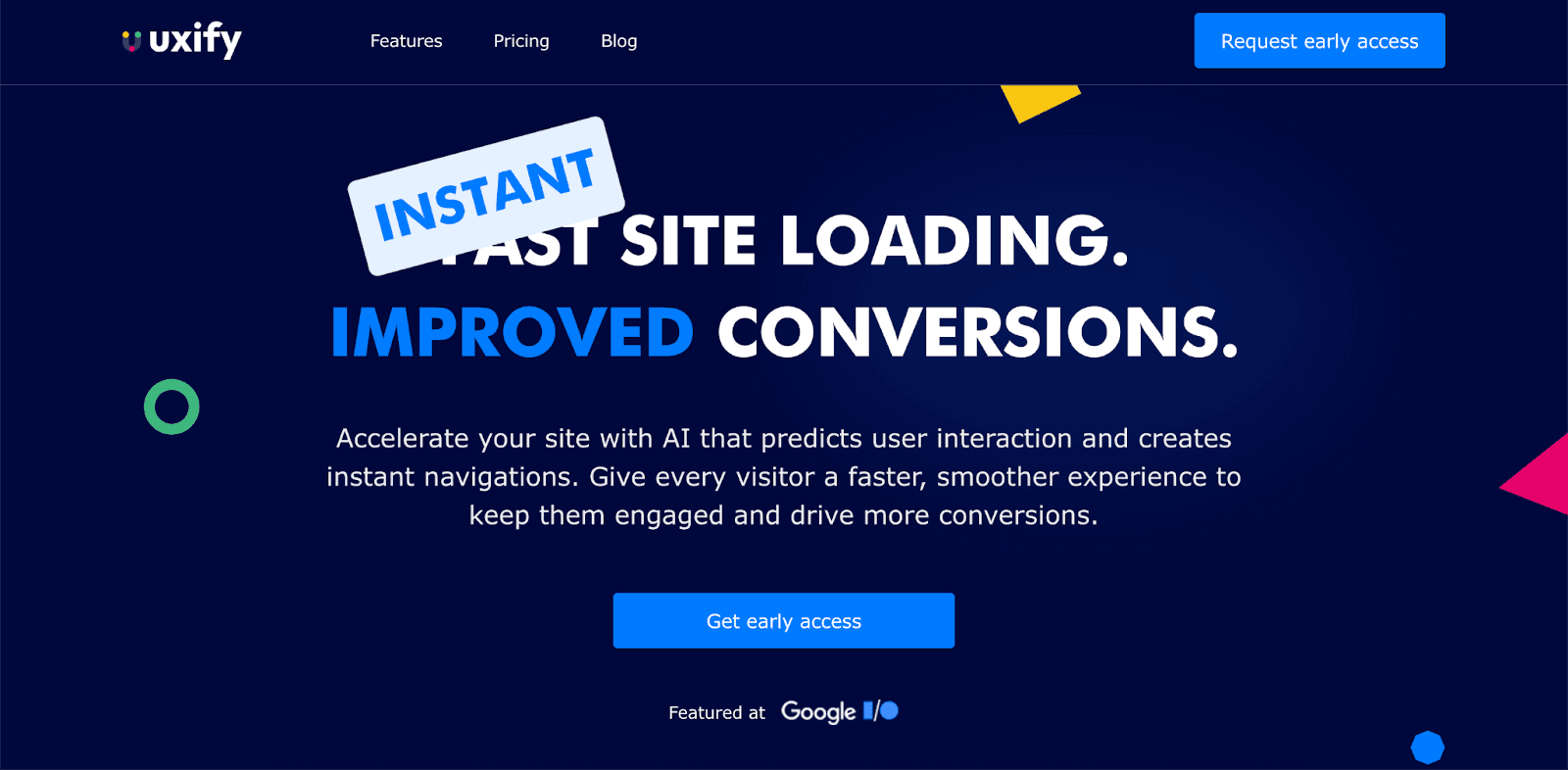
Best for: Ecommerce stores aiming to provide instant-loading product pages and seamless browsing experiences.
Navigation AI speeds up ecommerce stores by leveraging artificial intelligence to predict a shopper’s next action and prerender the page in the background. For ecommerce sites, this means that when a customer clicks to view a product or checkout page, it loads instantly, creating a frictionless shopping experience. This is particularly valuable during high-traffic events like holiday sales, where even minor delays can lead to cart abandonment.
By significantly improving load times and optimizing Core Web Vitals, crucial metrics Google considers for rankings, Navigation AI helps ecommerce businesses enhance user experience, improve SEO performance, and boost conversion rates. It’s an essential tool for stores prioritizing speed and customer satisfaction in a competitive market.

Lumar (previously DeepCrawl)
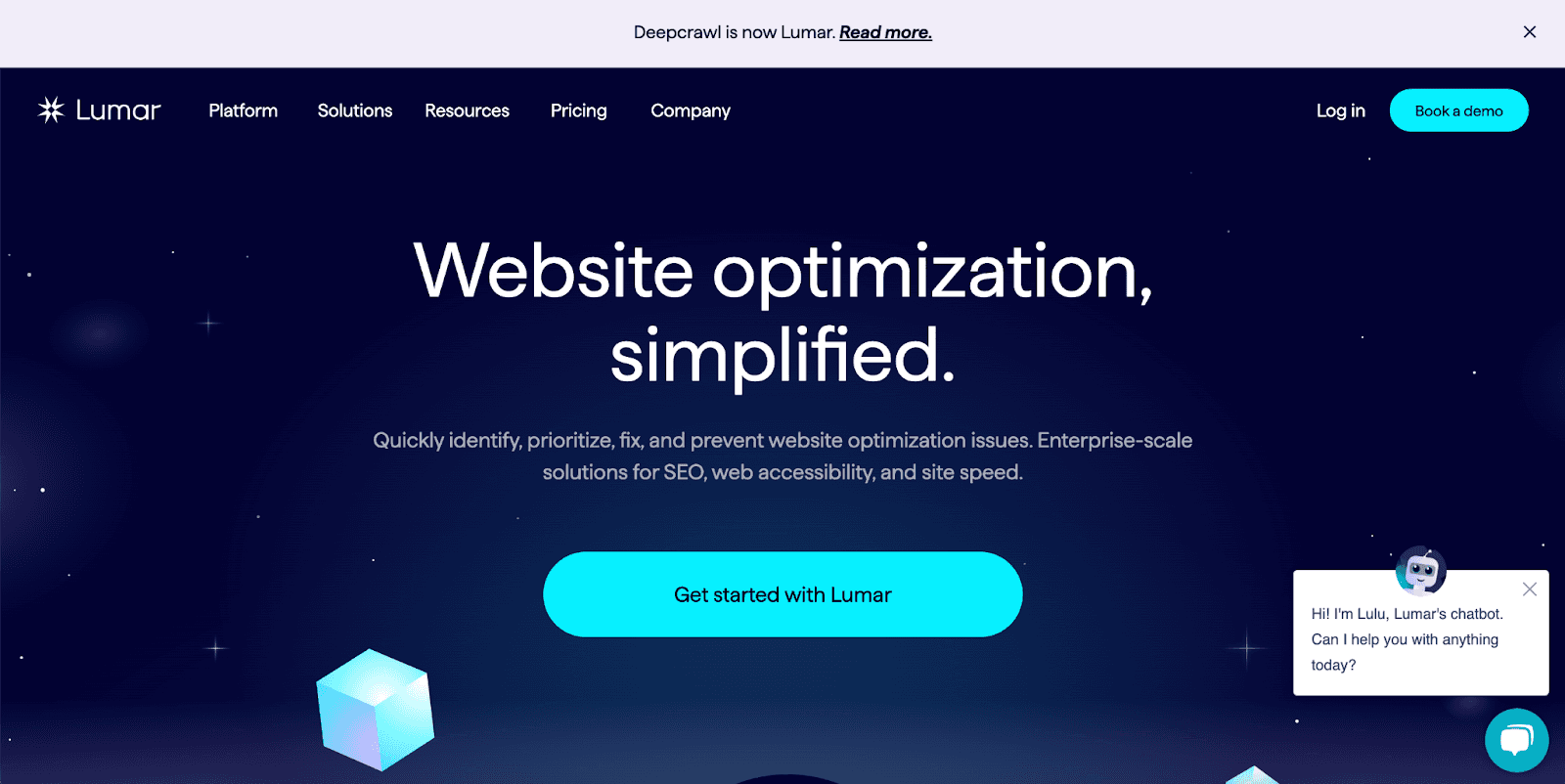
Best for: Large ecommerce websites and enterprises managing extensive product catalogs and complex site structures.
Lumar uses AI to conduct thorough technical SEO audits, pinpointing critical issues like broken links, duplicate content, crawl errors, and blocked resources. For ecommerce stores with thousands of product pages, this tool ensures that every page is accessible and optimized for search engines. For example, a large online retailer can use Lumar to identify missing alt text on product images or resolve pagination issues affecting their product categories. The platform provides actionable insights to improve site architecture and internal linking, which are essential for better indexing and search engine visibility.
Screaming Frog SEO Spider
Best for: Ecommerce businesses managing diverse product pages and requiring detailed, customizable site audits.
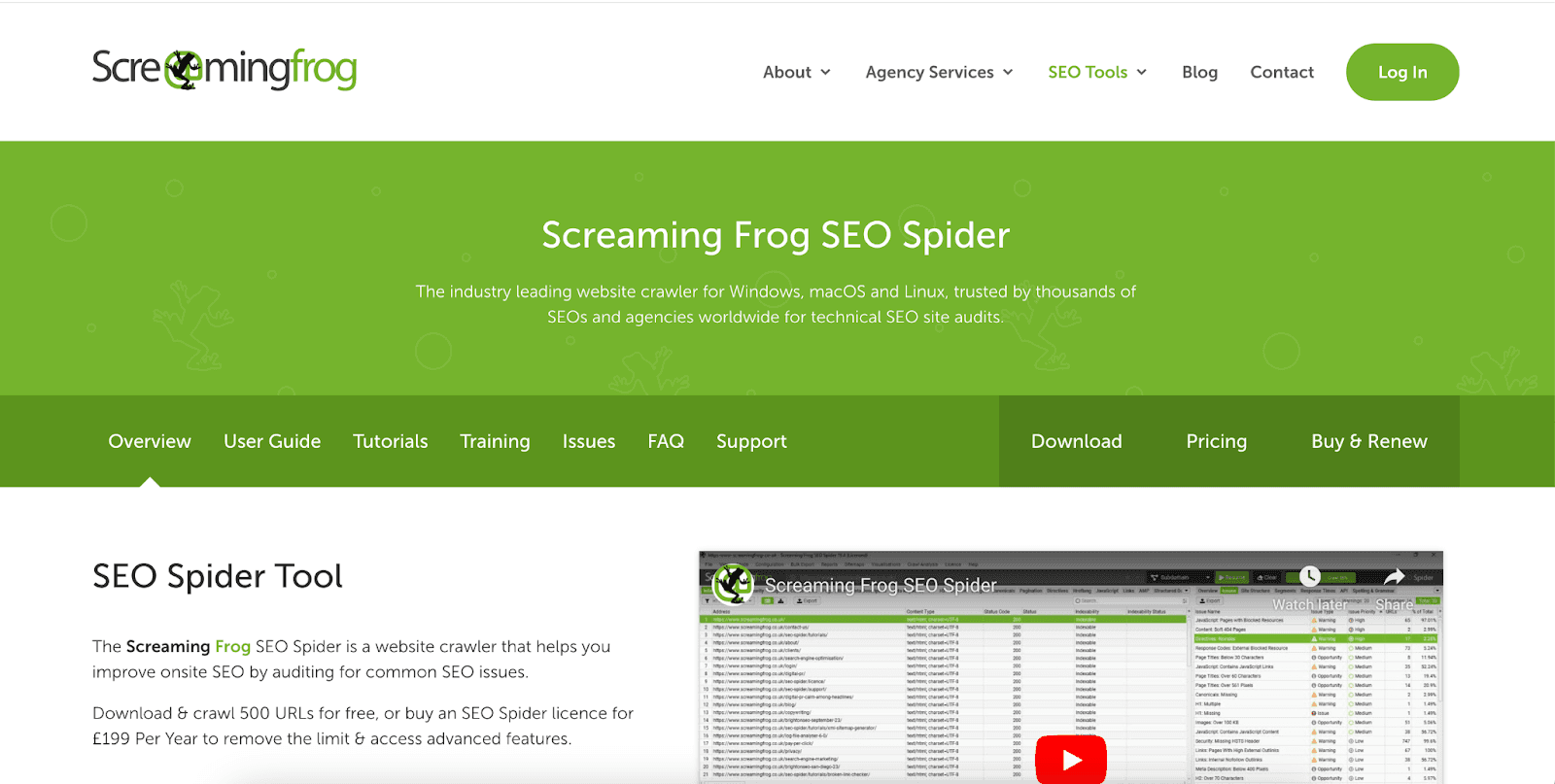
Screaming Frog SEO Spider leverages AI-driven analysis combined with manual configurations to conduct in-depth crawls of ecommerce websites. It identifies technical SEO issues such as broken redirects, missing metadata, duplicate content, and pagination errors, which are common in large ecommerce stores. The tool provides real-time data extraction and integrates seamlessly with platforms like Google Analytics and Search Console, offering a holistic view of SEO performance.
Why use AI for technical SEO?
AI takes the guesswork out of technical SEO by providing precise, actionable insights and automating complex tasks. Tools like Navigation AI by Uxify and others not only ensure your site is technically sound but also help deliver a seamless user experience, which is key to both rankings and customer satisfaction. By integrating AI into your technical SEO workflow, you can focus on strategy and growth while letting the technology handle the heavy lifting.
How AI helps optimize for voice search
Voice search is transforming how users interact with search engines, shifting from typed queries to natural, conversational questions like, “Where can I buy eco-friendly sneakers?” spoken through mobile devices, smart speakers, or even cars. Optimizing for voice search without AI is challenging as it requires understanding natural language patterns, predicting varied user intents, and crafting content that provides direct answers, all while keeping up with evolving search trends.
AI simplifies this process by analyzing conversational queries, automating intent prediction, and ensuring your site delivers clear, helpful answers that rank for voice searches. By leveraging AI, your site can effectively meet the demands of voice search users and increase its chances of being the precise answer they hear.
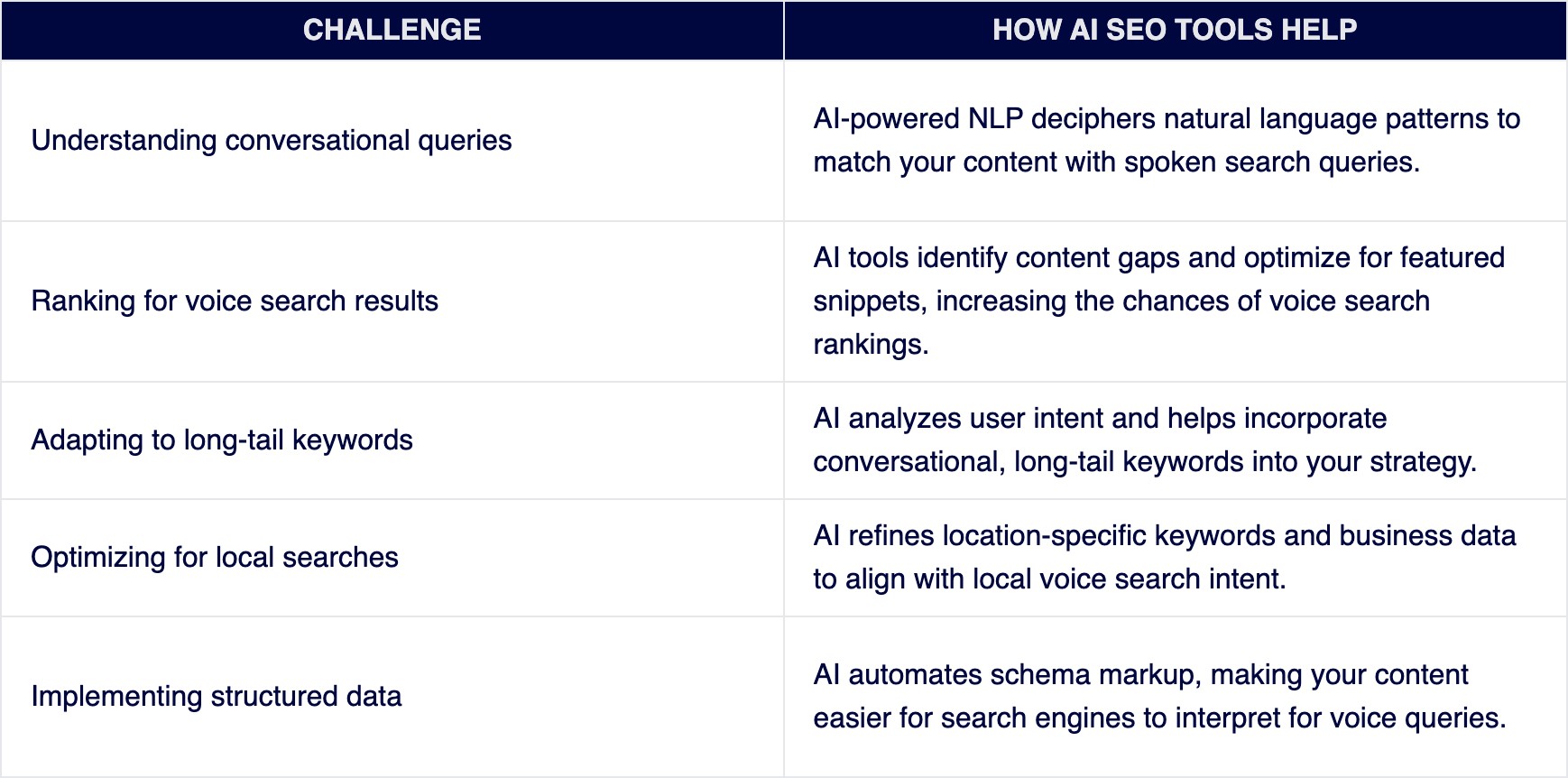
AI Tools for voice search optimization
WordLift
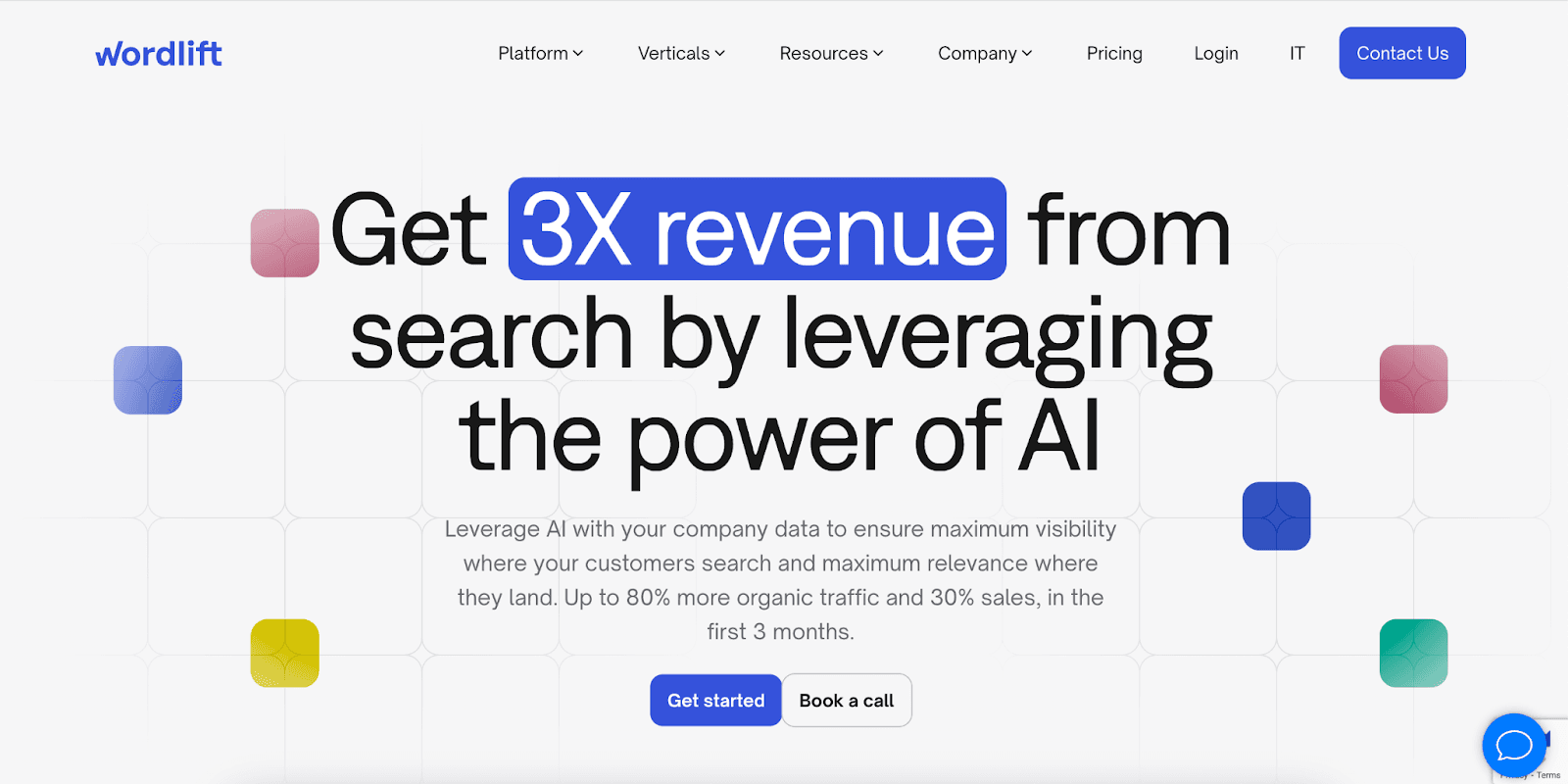
Best for: Ecommerce businesses aiming to enhance voice search visibility by leveraging structured data and semantic SEO.
WordLift uses AI to enrich ecommerce websites with structured data, helping search engines understand and categorize product information more effectively. For example, an online furniture store can use WordLift to create structured data for products like "modern sofa" or "wooden dining table," aligning with natural language queries such as, “What’s the best wooden dining table under $500?”
By organizing content into entities and applying schema markup, WordLift improves a site’s ability to appear in voice search results and featured snippets. This ensures ecommerce businesses are better equipped to match user intent, making their products and content more accessible to customers using conversational voice search.
BrightLocal
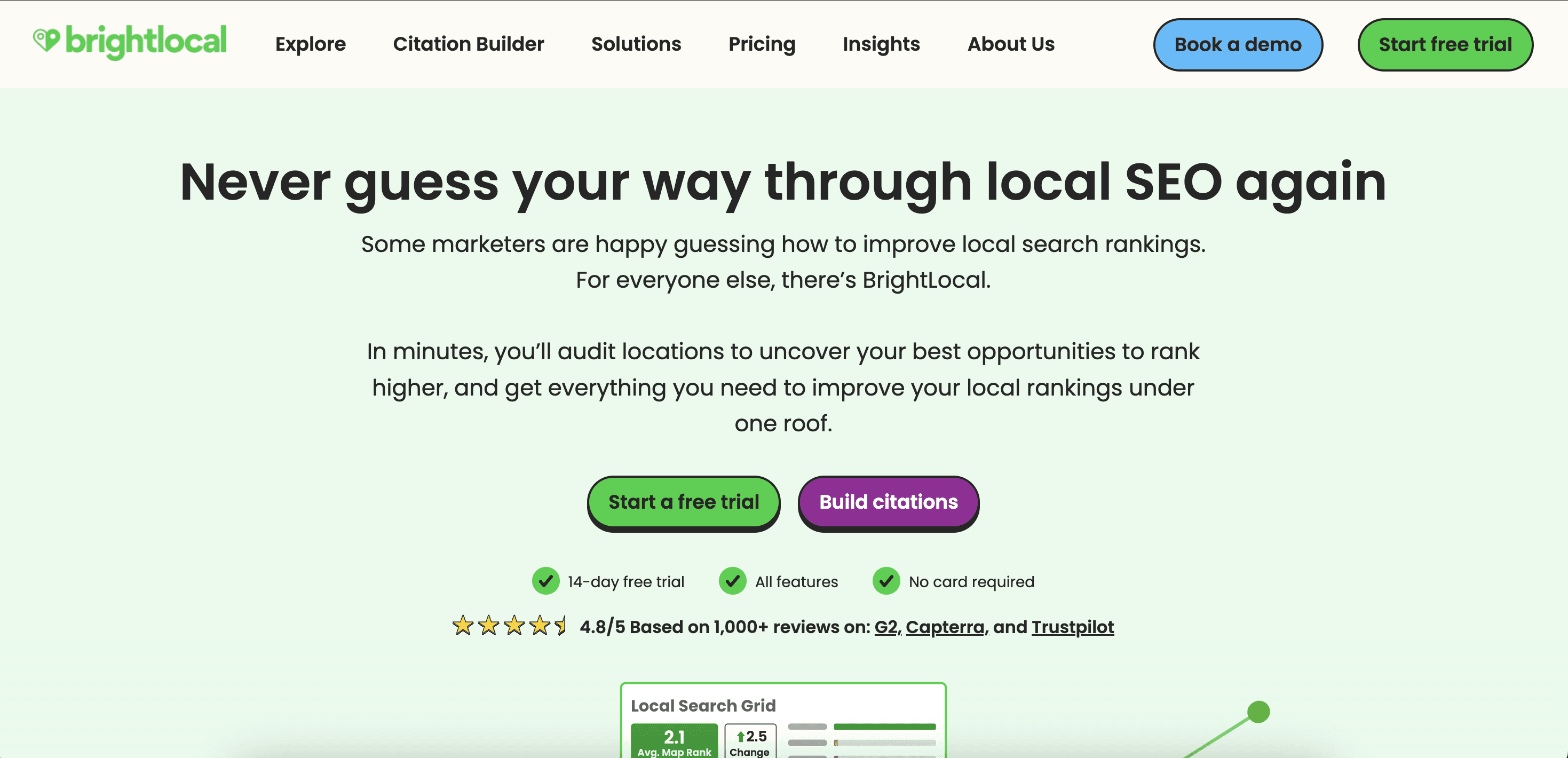
Best for: Ecommerce businesses with a local presence, focusing on location-based voice search optimization.
BrightLocal leverages AI-powered tools to enhance local search performance by analyzing and refining business listings. It helps identify inconsistencies in crucial business details such as address, contact information, and hours of operation. For example, a local bakery offering online orders can ensure their listing is optimized to appear in voice searches like, “What bakery is open near me?”
The platform also provides tools for optimizing local keywords and maintaining data consistency across platforms like Google My Business and Yelp. These features make BrightLocal particularly effective for ecommerce stores targeting voice queries with a local focus, improving discoverability and ensuring accurate information for potential customers.
Why optimize for voice search with AI?
Voice search optimization requires an approach that goes beyond traditional SEO. AI tools offer the ability to analyze conversational queries, predict user intent, and deliver actionable insights that ensure your content is ready for this growing trend. By leveraging AI, you can meet the demands of voice search users while staying ahead of your competition in this evolving space.
How AI enhances image and video SEO
Visual content is pivotal in engaging audiences and enhancing SEO performance. Notably, 91% of businesses utilize video as a marketing tool, with 88% recognizing its integral role in their overall strategy. However, manually optimizing images and videos for search engines is labor-intensive, involving meticulous tasks such as compressing files, crafting descriptive filenames, writing alt text, and managing metadata. This process is not only time-consuming but also prone to human error, which can hinder SEO efforts.
AI-driven tools alleviate these challenges by automating the optimization process. They efficiently handle tasks like image compression, alt text generation, and metadata management, ensuring visual content is accessible, discoverable, and effective in boosting search visibility. By streamlining these processes, AI enables businesses to maintain high-quality visual content that enhances user engagement and improves SEO performance.
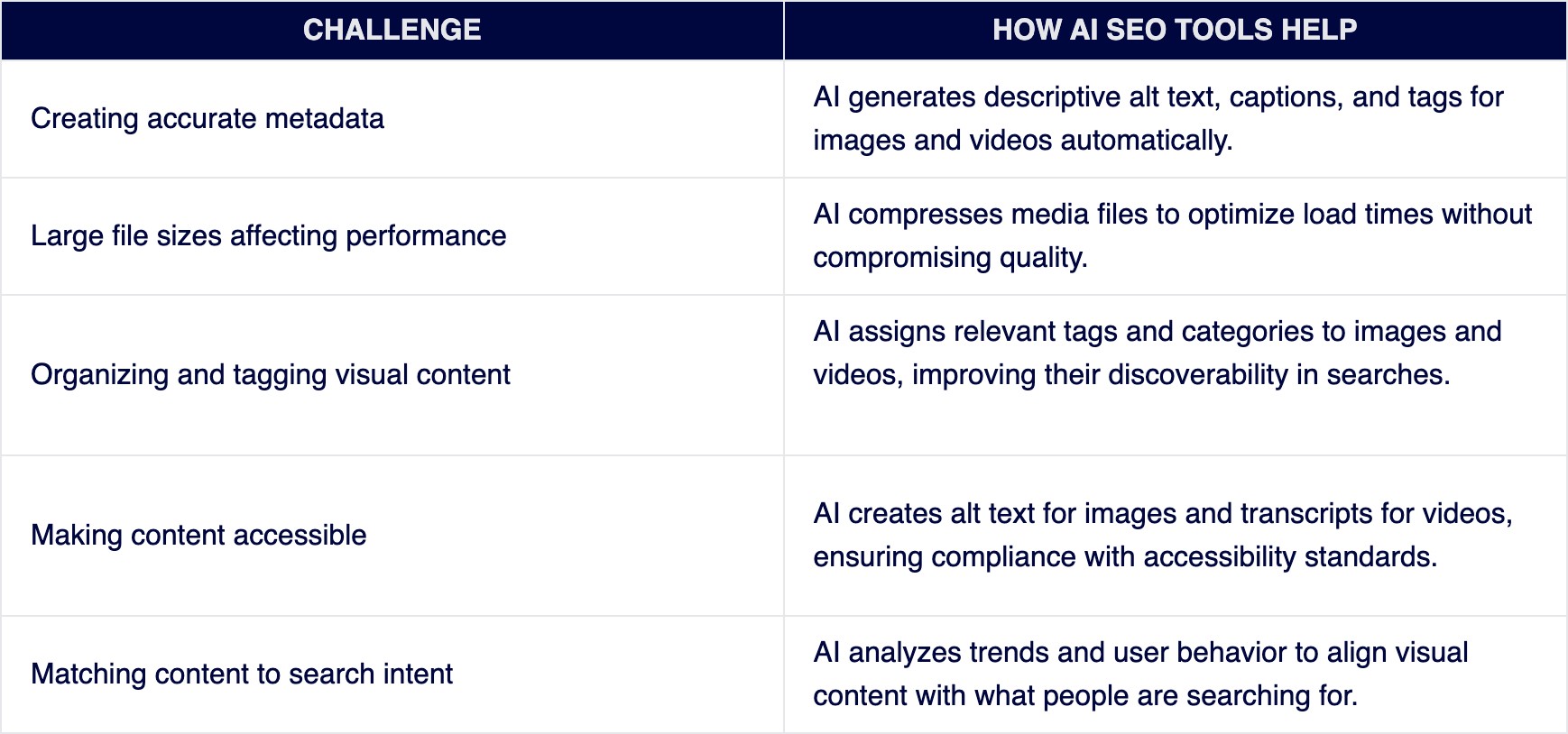
AI Tools for image and video SEO
Cloudinary
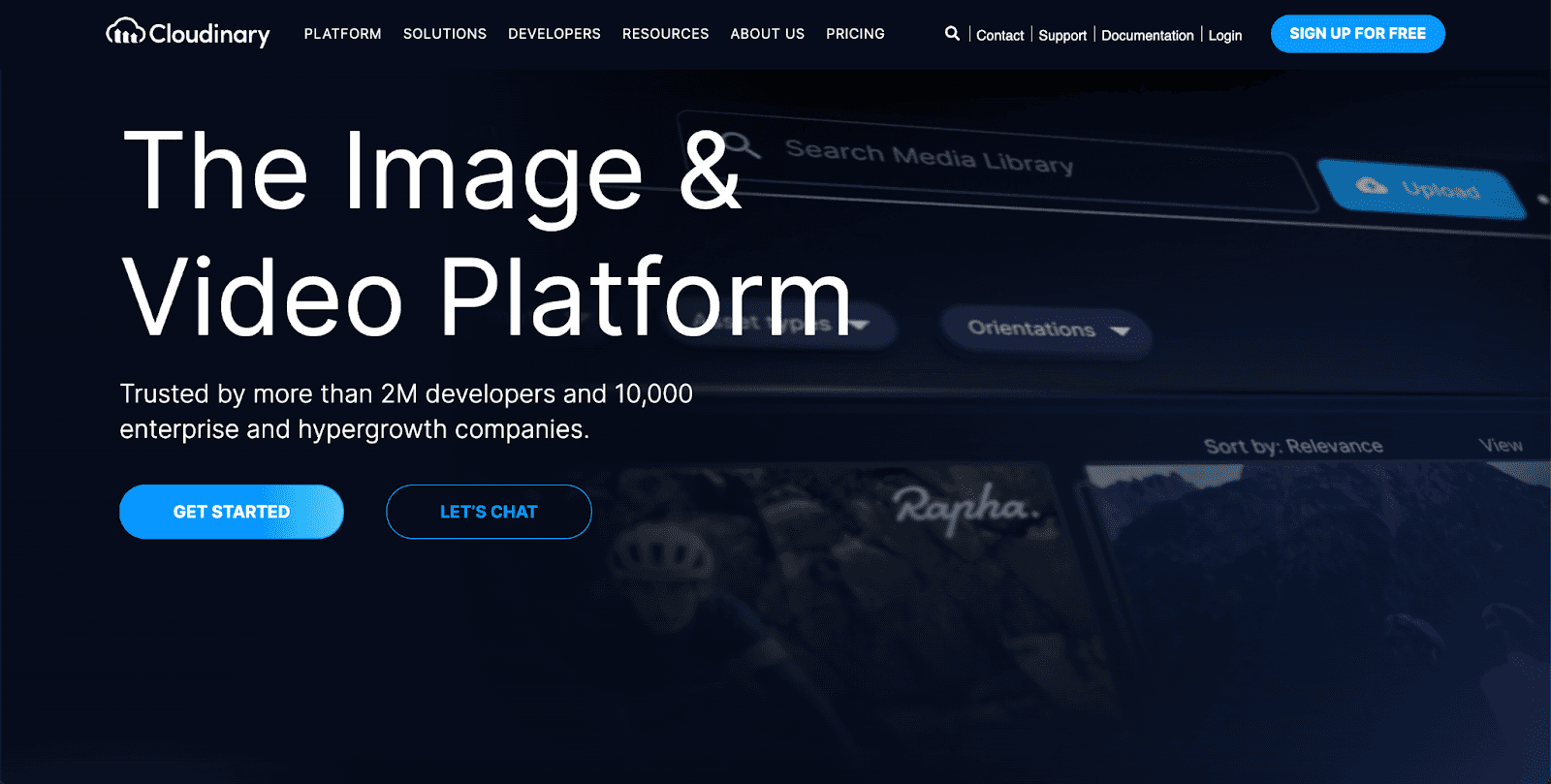
Best for: Ecommerce teams managing a high volume of product images and videos, looking for efficient optimization solutions.
Cloudinary offers tools for automating the optimization of visual content, such as resizing, compression, and format conversion, to ensure fast loading and high-quality visuals. Its AI features, like auto-cropping, help focus on important visual elements, making content more user-friendly and accessible.
For instance, an ecommerce business can use Cloudinary to resize images for mobile and desktop or compress promotional videos for quicker loading. These optimizations improve page performance and SEO while simplifying the management of large media libraries for ecommerce teams.
Rev
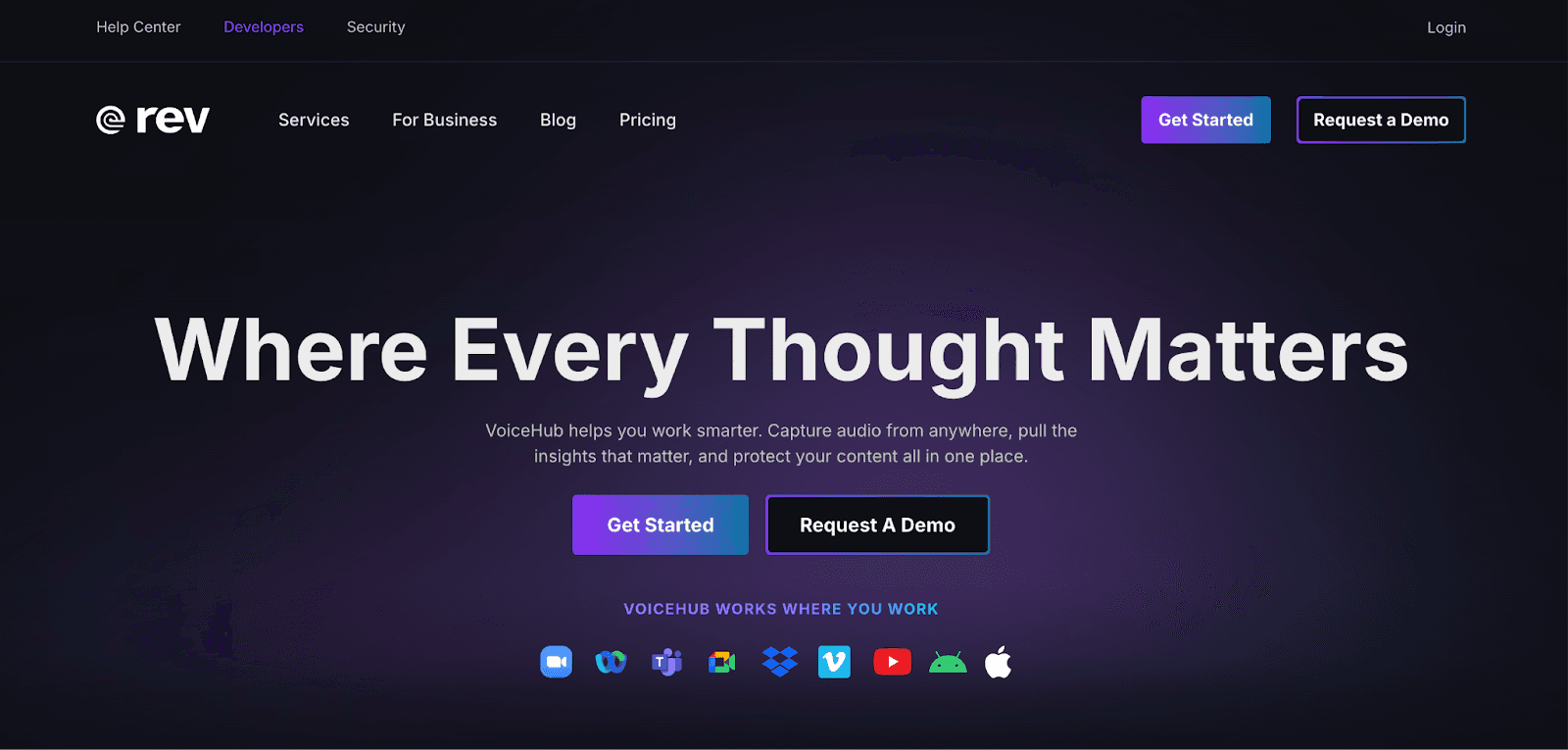
Best for: Ecommerce stores looking to optimize video content for search engines and improve accessibility.
Rev’s AI-powered transcription tools automatically generate accurate text for product demos, tutorials, or promotional videos. For instance, an online electronics retailer showcasing a product like a new smartphone can use Rev to create detailed transcripts and captions. These transcripts improve video SEO by making the content searchable, enhancing discoverability for queries like “how to use the latest smartphone model.”
Why use AI for image and video SEO?
AI simplifies the complex process of optimizing images and videos for search engines. By automating tasks like metadata creation, file compression, and content tagging, AI ensures your visual assets not only look great but also perform well in search results. With AI, you can make your media content more accessible, relevant, and impactful, driving more traffic and engagement to your site.
Conclusion: integrating AI SEO into your ecommerce strategy
The ecommerce landscape is competitive, with businesses competing for visibility in a rapidly growing digital market. AI offers a strategic advantage by automating time-consuming SEO tasks, optimizing content, and personalizing user experiences to align with search engine criteria. Here’s a step-by-step map to seamlessly integrate AI into your ecommerce SEO strategy:
🏁 Starting Point: Define Your SEO Goals
What’s your ultimate objective?
What challenges are holding you back?
For instance, if slow page load times are causing high bounce rates, your goal might be to optimize site speed. Or, if competitors are outranking you for key terms, focus on keyword targeting. This step is your map, guiding every decision ahead.
Checkpoint: Clear goals and challenges identified.
📍 Marker 1: Choose your AI tools
Each tool is a key to unlocking SEO treasure:
Struggling with keywords? Semrush or Twinword Ideas are your pickaxes for uncovering valuable search terms.
Content not ranking? Let Jasper AI or MarketMuse help you craft engaging, optimized content.
Site bogged down by technical glitches? Navigation AI and Lumar will clear the path.
Need visual content optimized? Rely on Cloudinary or Rev to lighten your load.
Checkpoint: Tools selected and ready to integrate into your strategy.
📍 Marker 2: Automate your workflow
Let AI streamline repetitive tasks:
Automate keyword updates and performance tracking.
Use AI to create optimized product descriptions and blog content.
Run AI-powered technical audits to ensure your site stays error-free.
Checkpoint: Workflow enhanced with AI-powered automation.
📍 Marker 3: Review and Refine
Return to your map regularly to track progress:
Monitor performance data to assess the impact of AI tools.
Use insights to tweak strategies and stay ahead of competitors.
Checkpoint: Continuous improvement cycle in place.
By incorporating AI into your SEO strategy, you can stay ahead in the competitive ecommerce market, delivering faster, more personalized experiences that engage users and boost search visibility. Embrace AI as your strategic ally to drive long-term growth and success. For more AI-powered ideas to grow your ecommerce business, check out our article on the best ecommerce tools for growth in 2026: AI Tools for Ecommerce Growth.
Ana has spent over five years helping businesses create faster, more user-friendly websites that truly connect with their audience. Passionate about ecommerce, UX, and AI, she loves turning complex challenges into seamless online experiences. Ana’s insights have even been featured in the Performance Calendar, where she shares her love for all things web performance.
